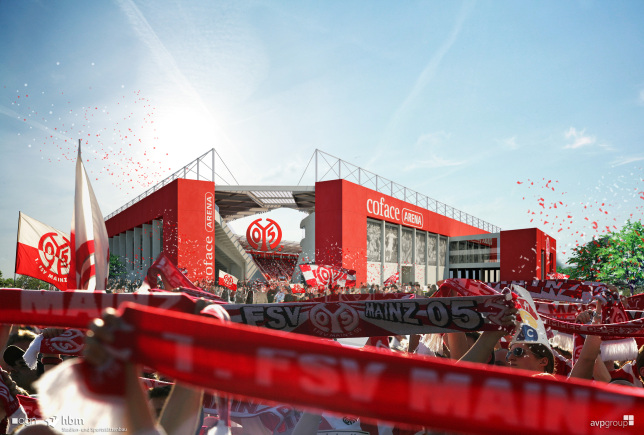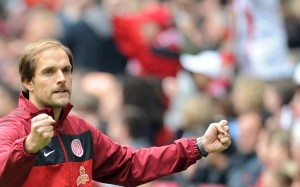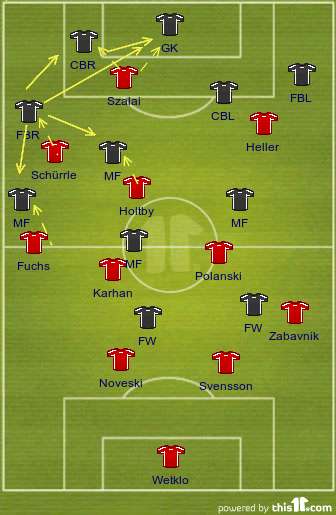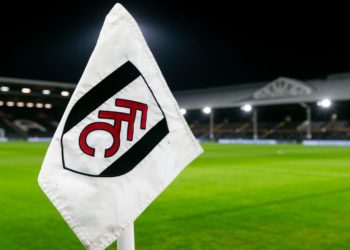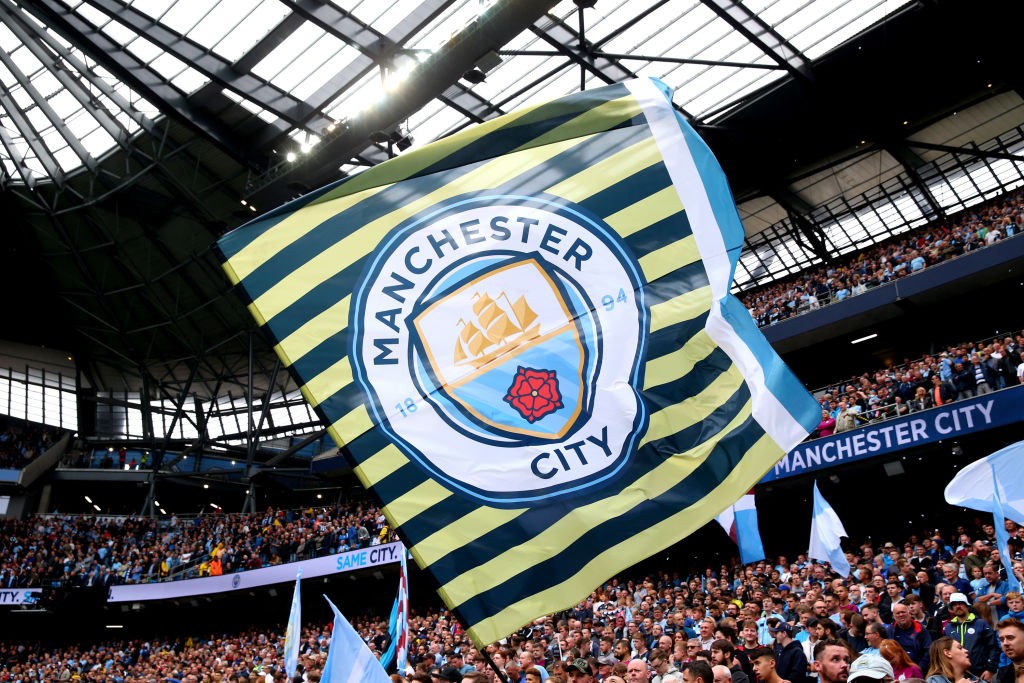“Mainz play the way romantics still perceive English football.”
— Süddeutsche Zeitung.
The general feeling of euphoria is still raw in North Rhine-Westphalia. Yes, Borussia Dortmund have done it after almost a decade. Let us take a break from an usual The Borussian aficionado and travel off the beaten path to Rhineland-Palatinate’s capital city, Mainz where the fans of the self proclaimed Carnival Club are also warming the cockles of their hearts on the prospect of making it to Europe. With 52 points from 32 games, Mainz are five points clear off 6th placed Nürnbergand and are favorites to qualify for the Europa League with only two more games to play. A solitary point from the next two games, one of which is a home game against relegation candidates St.Pauli will seal Mainz’s European deal.
Since the foundation of Bundesliga in 1963, Mainz mostly played in the second division. Due to financial problems the club withdrew itself to regional football league Oberliga Südwest, the fifth tier of the German football league system. The eternal relegation battlers came close to get promoted to Bundesliga in 1997, 2002 and in 2003 but on each occasion they finished just out of the promotion zone. Under Jürgen Klopp’s guidance, Mainz, for the first time in its history, were promoted to the Bundesliga in 2004. They remained in the top flight for the next three seasons before going down again. In the 2005-06 Uefa Cup, Mainz earned a spot as Germany’s nominee in the “Fair Play” draw which acknowledges positive play, respect for one’s opponent, respect for the referee, the behavior of the crowd and of team officials, as well as cautions and dismissals. Their European sojourn, though, ended in the first round in a 2-0 aggregate defeat at the hands of the eventual champions Sevilla.
Last year Mainz won back promotion to Bundesliga and finished in 9th spot, their best ever position in Bundesliga. At that time nobody would have imagined the transformation the side is going to make in the coming season, by becoming title challengers from relegation battlers. They started the season with a bang, winning seven games on trot, a record matched only by Bayern Munich (1995-96) and Kaiserslautern (2001-02) in the past. Mainz remained on top till the ninth game of the season and only a defeat at the hands of Dortmund pulled them down from the pole position. Speaking about record, they even overturned a three goal deficit in an away game and won it(against Wolfsburg)- a feat last achieved more than a couple of decades back. So, just how did this all happen?
Enter Thomas Tuchel – the talisman of the Oh Fives. He plied his trade as a defender for SSV Ulm, a third tier side. He represented the club for four years before a chronic knee injury put an end to his amateur career at the age of 24. Tuchel chose to enroll in a university to study economics and worked as a part time bar-tender in what is now Stuttgart’s Radio Bar. After earning his degree but still in love with the game, Tuchel worked as an intern to Ralph Rangnick for a while and was later given management duty for Stuttgart’s U14 side. Soon he became the manager of their U19 side and in 2005 he won the U19’s Bundesliga with them. He earned his professional badge in 2007 and in 2009 he won the U19’s Bundesliga again, this time with Mainz. And in the next season (2009-10), Mainz management made him the manager of their senior squad.
Tuchel, though, had to work with a shoestring budget, still managed to bring in as many as ten new members to the team – four of whom has been borrowed – Malik Fathi (Spartak Moscow), Lewis Holtby (Schalke 04), Christian Fuchs (Bochum), Marcel Risse (Bayer Leverkusen). Ádám Szalai, who was loaned last season, became their most expensive acquisition. Schürrle was promoted to the senior squad. Tuchel opted a multi-faceted tactical approach. He followed Barcelona’s game closely and tried to implement their ball winning philosophy in Mainz’s game,
“Their outstanding quality is their devotion and passion when it comes to winning the ball back in the opposition’s half once they lose it. That’s only possible with a huge amount of humility. It’s not a given that stars at this high level are collectively committed to an idea and that no one takes the liberty of doing a little less of the hard work.”
When it comes to formation, Tuchel prefers a variation of 4-5-1, that is 4-2-3-1, 4-3-2-1 or even a 4-3-1-2 and occasionally a 4-4-2 Diamond but none of them are fixed. He makes several changes in the formation in a single game, solely based on the needs in accordance with the game and his players have been trained to be on the beck and call of these formation changes. In practice sessions his young protégés are asked to learn new things in every training sessions – making the approach vary from practice session to practice session. The only thing constant in his tactical philosophy is plenty of running, intense pressing and the fastest possible switch from defense to attack and vice versa. The midfield is preferred to be kept narrow and the fullbacks are delpoyed to play a more attacking role. As a result, more often than not the variety of 4-5-1 takes shape of 4-3-3 or even a more attacking 2-3-5. The alacrity of transition from defense to offense and vice versa is the key aspect here.
In modern day football, in the creative build up of any team, it is seen that it is the fullbacks who see much of the ball. The centre halves spread the ball towards either of the wings at the back. The fullbacks then connect with the holding midfielders and the playmakers and keep running forwards, taking a marker or two along with them and keeping the opposition guessing whether the buildup is going to be through the centre or the flanks. Mainz’s pressing and ball winning starts very high up, in the attacking third to pressurize the fullbacks. It reduces the angle of vision the fullbacks need to pass the ball. The pressed team in turn reduces its own space to deal with the pressing. The sole striker’s responsibility would be to keep pressurizing the centre halves and the goal keeper, while the wingers will pressurize the opposition fullbacks in unison, only to force them to lose possession and make mistakes. The central attacking midfielder’s job at that time would be to keep a tab on the opposition holding midfielder so that when the pressurized fullback tries to find the holding midfielder, he is there to close the holding midfielder down.
Thus, by pressurizing at the attacking third what they do is to keep the ball deep in the other half. The opposition midfielders, wingers and strikers are forced to drop deep to win the ball back and move forward. Seeing the opposition wingers drop deep, Mainz fullbacks keep close watch on them and at times go more forward to assist their own wingers in pressurizing the opposition fullbacks. The couple of holding midfielders will remain in their position to keep check in any counter attack through the middle. The other holding midfielder or central midfielder would on that occasion try to fill the space left by the fullback who went forward. Thus, the stage is set for Tuchel’s men to go for the jugular. The advantage of winning back possession at the other end of the pitch keeps the ball mainly in the other half or at the most in the middle of the park. This strategy of pressurizing fullbacks to make mistakes and transition from defense to offense in fast dinky passes had been one of the reasons behind Tuchel’s men’s early success story in the league which included a thumping victory over Bayern Munich at Allianz Arena.
Tuchel adopted myriad drills to help the young side adapt the game plan and remain as a cohesive unit. Just like Jürgen Klopp, he believes that the technical aspect of the game has to be interspersed with the mental part of it. He has worked with Professor Wolfgang Schöllhorn of Mainz University, an expert in kinesiology or human movement, the man who pioneered the idea of differential learning,
“The idea is that there is no repetition of drills, no correction and players are encouraged not to think about what has gone wrong if they have made a mistake. They have to be creative and take responsibility and have to find the optimal solution. It’s a whole philosophy.”
To grasp the technical part, Tuchel’s hive of worker bees would be made to play 20-a-side games or play 11 against 11 in one half of the pitch, to improve speed, control and agility and sense of movement of fellow teammates. Certain set of players, specifically the wingers and attacking midfielders are asked to move within specified areas to pressurize the fullbacks. The attacking team has to be aware of the position of their colleagues and their markers. It would be their responsibility to find a way to keep the possession and go forward – by trying off the ball runs and taking the marker along, creating empty space for another team mate. The defensive team’s target would be to win the ball back by pressurizing the opposition. Tactics would only be discussed using videos and later on Tuchel would be seen analyzing the videos of the games played as well as of the practice sessions.
To understand cohesion, cooperation and the mental part of the game, Tuchel has administered a few methodologies of his own. The players are supposed to call each other with their first name only. They are also requested to make eye contacts while greeting each other with a ‘Good Morning’. Tuchel stresses good manners, punctuality and personal development. “He combines absolute authority with humanity,” said Holtby. In the words of Tuchel himself, “Leading a Bundesliga team is 100% about human relations. My idea of leadership is all about respect and appreciation.”
But yes, there are holes in the swiss cheese.Not that the system of shuffling between different formations has proved difficult to cope with. It is the sheer physical intensity of Tuchel’s game plan which needs players with high work rate and stamina so that they can run for the entire 90 minutes and also remain fit for a significant part of the season. The team did not last long in DFB Pokal and had no European commitments either. Despite that, the young team could not cope with the physicality of the nature of their game week in week out and soon the team’s performance graph was on the skids. Burn out – an expected effect of Tuchel’s system. To cope with it one needs a huge squad, which was not the case for Mainz. One particular name is German U21 captain Lewis Holtby, the modern day playmaker who started the season with a bang. After Mainz’s victory over Hoffenheim, Joachim Löw remarked about Holtby, “With Holtby I think you only need to see the first goal and how he set it up – that was pure class and was worth the entry fee alone.” He is the best example of the side-effect of Mainz’s style of play –much of his playmaking skills had to take backseat at the expense of defensive duties and soon he lost his steam. In the same lines, too much attacking duties have put the defensive abilities of Mainz fullbacks in the line of fire.
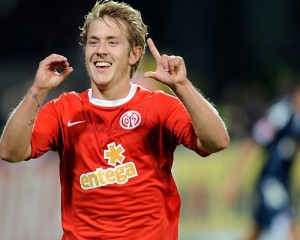 Come back stronger and fitter, Lewis
Come back stronger and fitter, Lewis
Oppositions, when subjected to relentless pressing, made mistakes and Mainz pounced on it. It was Jürgen Klopp’s Dortmund who showed that if Mainz’s pressing is countered with aggressive pressing in the midfield they are prone to give in as well. Their ball control is not up to the mark to withstand constant pressure, owing much of it to a squad with lesser quality. Soon, other teams followed suit and Mainz’ win-loss ratio kept decreasing. Tuchel must be aware of the primrose path that lies ahead for the team. Mainz will play in Europe next season. Holtby and Fuchs will probably go back to their respective clubs once their loan spells end. Bayer Leverkusen have already acquired the services of influential winger Schürrle from next season onwards. Not much of fund was raised as the playground, Stadium of Bruchweg, is the smallest in the league (capacity – 20,300). The team is expected to shift base to Coface Arena (capacity – 33,500) right from the next season. So Tuchel will have his task cut out as he might have to start right from the scratch in the next season. The curse of the 2nd season has been successfully averted. Can Tuchel overcome the poisoned chalice of third year? Probably yes! In Thomas Tuchel Mainz trust!
Chorus:
“God has kissed the earth only once,
precisely at this point where the Bruchweg is.
We are retaining the best in football, join in all:
We are just a carnival club. “
